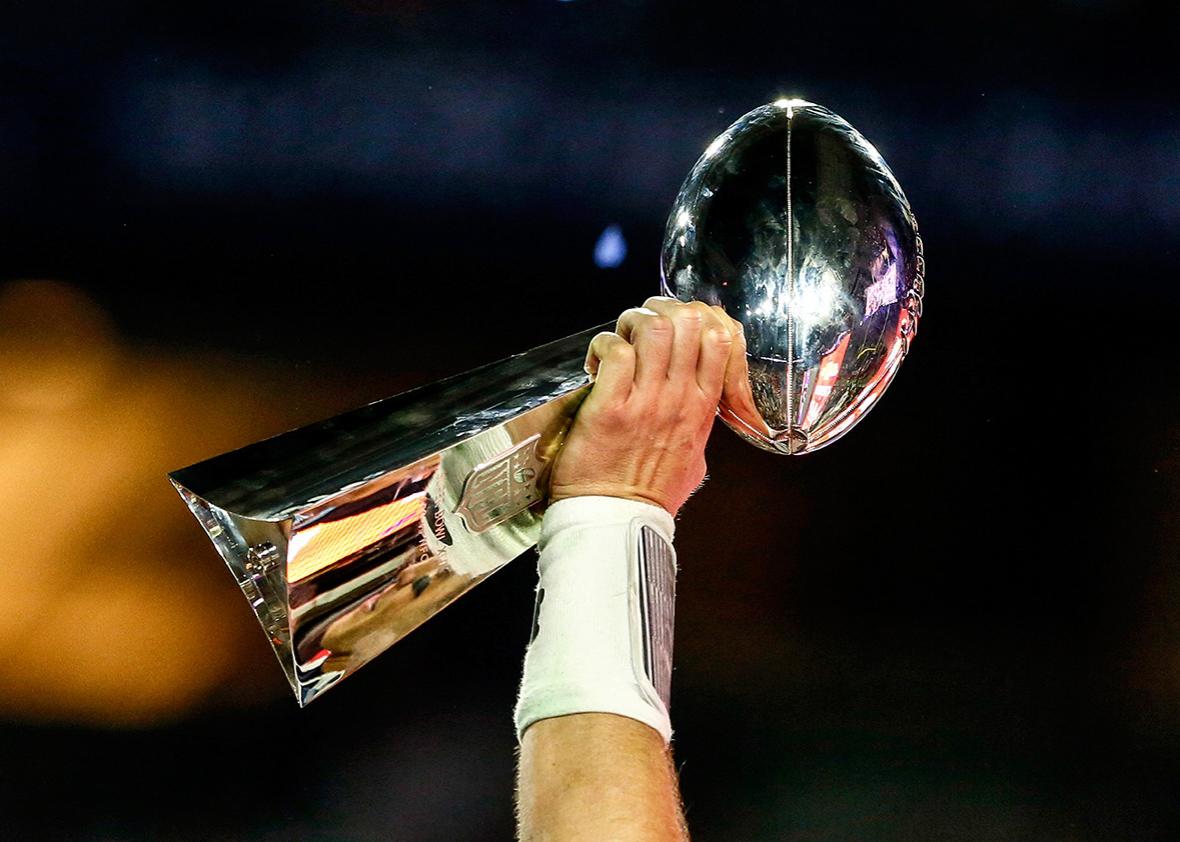Before the Super Bowl was the Super Bowl—before it was the secular American equivalent of Christmas, a royal coronation, and the M.A.S.H. finale rolled into one six-hour televised spectacular—it was the triumphant culmination of an ambitious millionaire’s extravagant vanity project. It was, also, a terrible football game.
In August 1959, upset at his inability to acquire a National Football League franchise of his very own, 27-year-old Lamar Hunt, son of billionaire oilman H.L. Hunt, took a few of his inherited millions and, along with some other rich dudes, founded a rival league. By mid-decade, the American Football League had grown to the point that the old league wanted a merger.
To celebrate this impending union, the leagues decided to pit their respective champions—the NFL’s Green Bay Packers and the AFL’s Kansas City Chiefs—against each other in a nationally televised game to end all games. The leagues, with their usual flair, dubbed the contest the AFL-NFL Championship Game. Hunt preferred a different name: the Super Bowl.
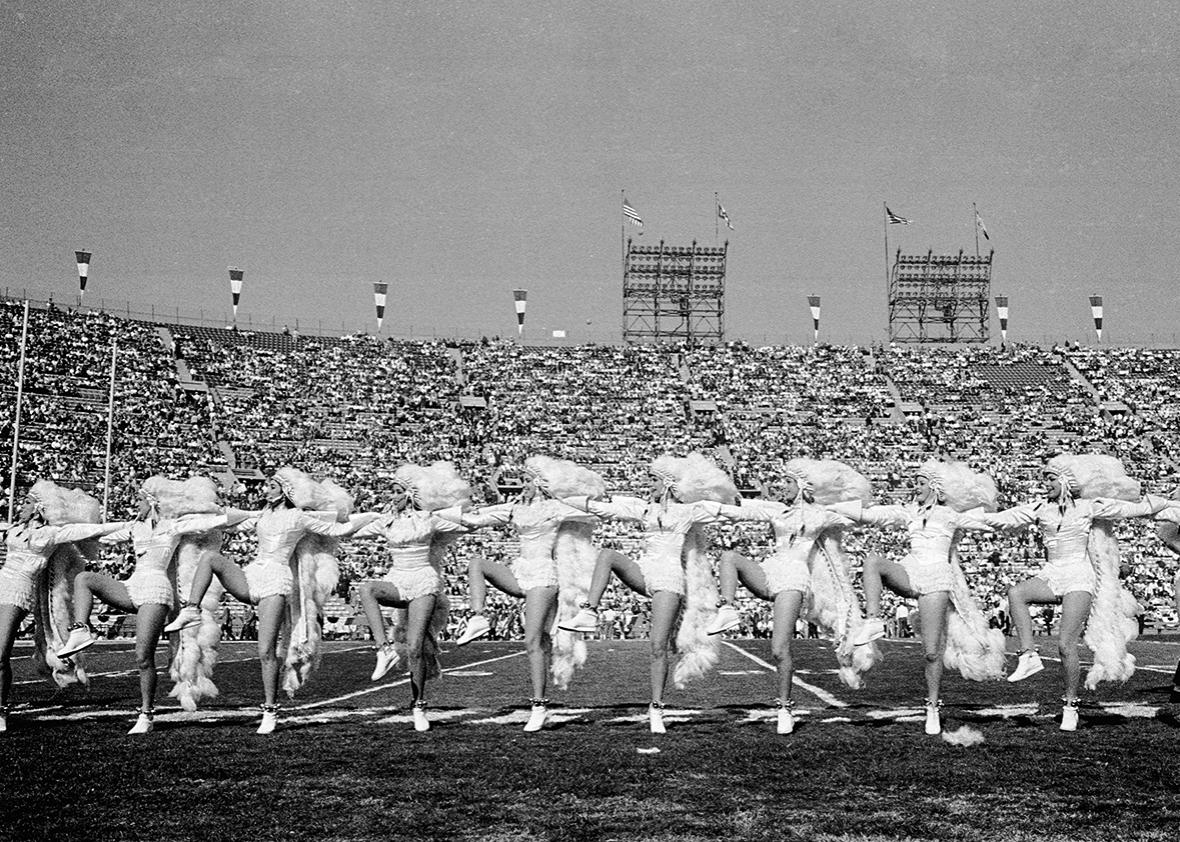
Cheerleaders perform in glamorized American Indian costumes at the first Super Bowl on Jan. 15, 1967, at the Los Angeles Memorial Coliseum.
CBS Photo Archive
On Jan. 15, 1967, the first Super Bowl kicked off at the Los Angeles Memorial Coliseum, accompanied by the sort of compliant Rotarian pageantry that always seems to be devised by people who wish to celebrate America without actually knowing anything about America. Three combined marching units paraded around the field in formation. There was a rousing rendition of “America the Beautiful.” Two guys wearing honest-to-God rocket belts took off from the field and zoomed around the skies for a few seconds. Oh, and, 4,000 pigeons were set loose, presumably in a gesture of peace. (According to the book When It Was Just a Game, at least one of them left “droppings” in Brent Musburger’s typewriter.)
Despite all of the spectacle, the name itself—coming from the combination of a Latin prefix meaning “above, beyond” and the word for the thing we eat soup from that sort of looks like a stadium—wasn’t entirely apt. Packers coach Vince Lombardi doubted the caliber of his opponent. Football fans were skeptical, too: More than 30,000 seats were empty at the Coliseum that day.
Ultimately, the game itself sort of sucked. Packers quarterback Bart Starr, possessor of the best name in football history, completely outclassed the Chiefs’ Len Dawson, possessor of a much lesser name. After halftime, the game quickly became a blowout. And yet 51 million people watched at home, enough to validate the concept and introduce the notion that the Super Bowl is the only football game that’s worth watching no matter what.
Five decades later, everyone likes the Super Bowl. Doesn’t matter who you are: a liberal or a conservative, a Twitter savant or a cloistered nun, a person who is not super or one who is a hater of bowls. You like the Super Bowl. You are going to watch the game this year—the 50th edition of the Super Bowl—and if you don’t watch it, you’ll be aware that you’re not watching it; that you’re missing something that you aren’t supposed to miss.
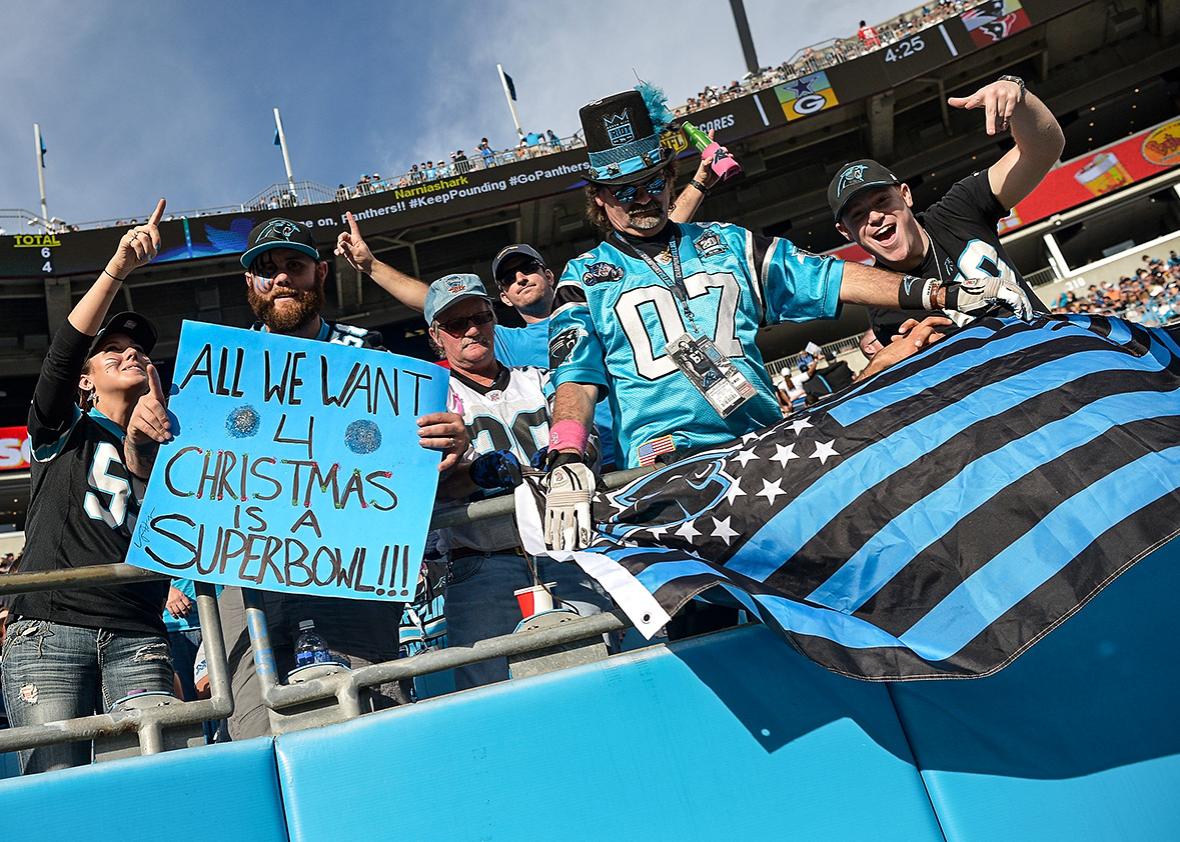
Grant Halverson/Getty Images
The game’s enduring popularity is simultaneously obvious and confounding. It’s obvious because, well, why wouldn’t the Super Bowl be popular? Football is America’s favorite sport, gambling on football is America’s favorite pastime, and both football and gambling only get better when augmented by friends, beer, and nachos. Even those souls who care little for sport can find something to like in the pageantry and parties, or, at the very least, in knowing that the Monday following the game is itself a tacit holiday: “Go-to-Work-Late-and-Hungover-if-You-Go-to-Work-at-All Day.”
And, yet, no other major sporting championship consistently falls as flat as does the Super Bowl. A football novice might walk away from a Super Bowl party impressed by the size of the crowd, entertained by the various commercials, or bloated from beer and bean dip. But she probably won’t walk away from the game a newly anointed football fan.
Was it ever worth watching? Has the Big Game always been more Big than Game? In honor of the event’s golden anniversary, I decided to take a deep, deep dive into the game’s history and find out. Over the past two months, aided by the good folks at YouTube and its less-scrupulous overseas equivalents, I have watched all 49 previous Super Bowls—roughly 160 hours worth of football, salesmanship, injury timeouts, and increasingly intense computer-generated graphics. I’ve spent most of my leisure time and a good chunk of my work weeks squinting at postcard-size videos on my laptop, hoping to peer inside the soul of the Super Bowl, or at least get some laughs at the expense of Garo Yepremian. (Regarding the latter: Mission accomplished!) I did not always finish watching every game—I admit to bailing out early from some of the blowouts; to tabbing over to other websites during boring stretches; and to occasionally leaving the game playing in one room while I went to have a beer in another. But I watched enough so that—with the possible exceptions of John Madden, the guy from Stump the Schwab, and the surviving members of the “Never Miss a Super Bowl Club”—I now probably know as much about the Super Bowl as anyone in the world.
So, in case you were wondering: Tom Landry is the best Super Bowl coach ever. The Pittsburgh Steelers are the best Super Bowl franchise ever. Jerry Rice and Lynn Swann are the best Super Bowl receivers ever. Doug Williams is the best Super Bowl quarterback ever. Roger Craig is the best Super Bowl running back ever. John Madden is the best Super Bowl commentator ever. “Elvis Presto” is the best Super Bowl halftime performer ever.
And the answer to the above question about whether the game was ever worth watching is this: Except for a handful of times, not really, no.
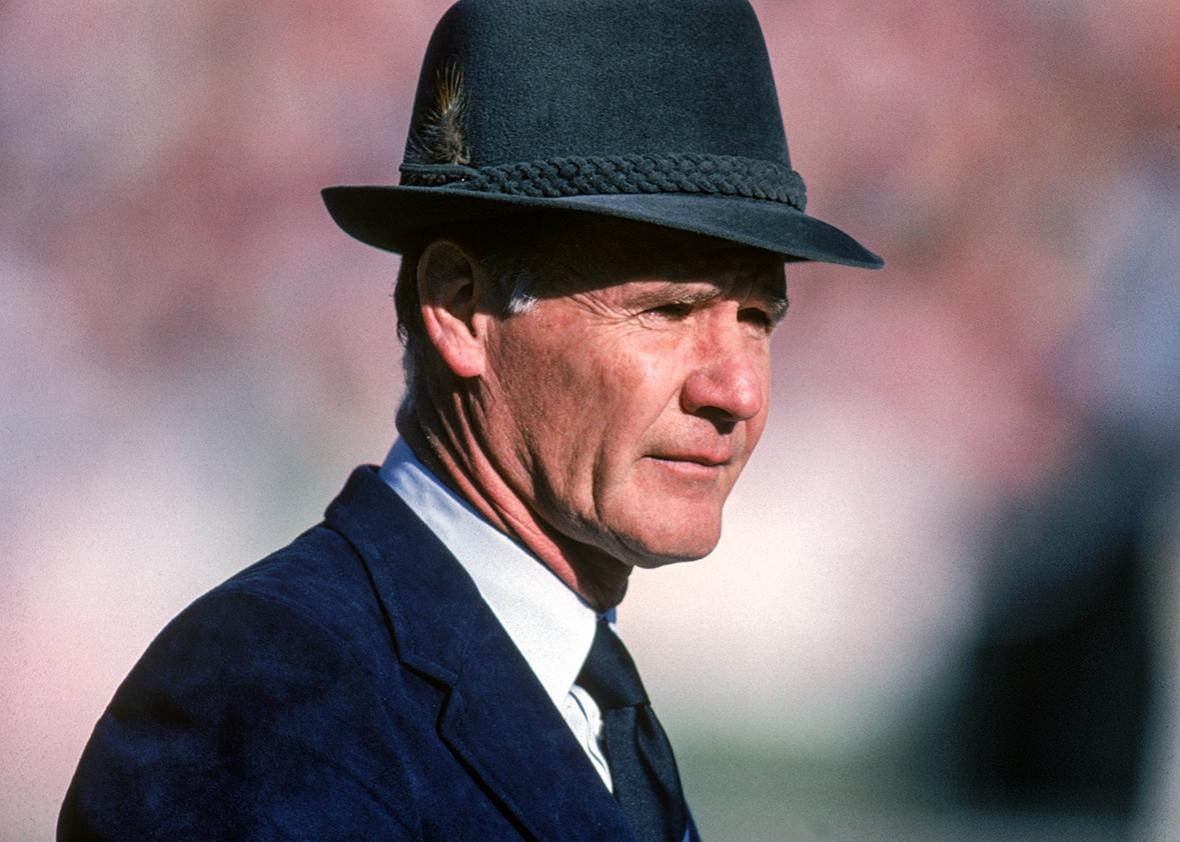
Tom Landry, head coach of the Dallas Cowboys from 1960 to 1988, watches from the sideline during a game in the 1980s.
Getty Images
Before getting into the more disappointing aspects of the Super Bowl—and what America’s national obsession with such a mediocre product says about us—let me briefly discuss the aforementioned Super Bowl legends. When I describe them as the best, I don’t mean the most statistically accomplished, or athletically gifted, or frequently victorious individuals. I simply mean the person or entity whose Super Bowl performances consistently offered the most joy. Tom Landry, for example, wasn’t the winningest coach in Super Bowl history, but he had the most style—and it wasn’t just the hat! His general finesse and fondness for trick plays improved every Super Bowl he coached in. (For example, in the Cowboys’ first offensive series in Super Bowl XIII he called for a convoluted reverse. The play didn’t work—Drew Pearson fumbled and lost the football—but how can any fan not love the audacity of such a call?)
I watched every single down of every single Steelers Super Bowl, because the Steelers play football as if it were an episode of American Gladiators; I nearly broke into spontaneous applause when, near the end of that same Cowboys-Steelers contest, Pittsburgh’s Mike Wagner hit Pearson in midair, and then lifted him up by his crumpled body and carried him backward and upside down by the torso for five yards.
Rice and Swann are simply the most delightful receivers in Super Bowl history, on top of being generally accepted as the most talented. See for yourself:
Roger Craig, the high-stepping 49er, might not be the most accomplished Super Bowl running back ever, but it is impossible to watch him run, his knees up to his abdomen, and not love him way more than Emmitt Smith.
Doug Williams only appeared in one Super Bowl, but it was a great Super Bowl—maybe the greatest—and his was the ultimate underdog performance.
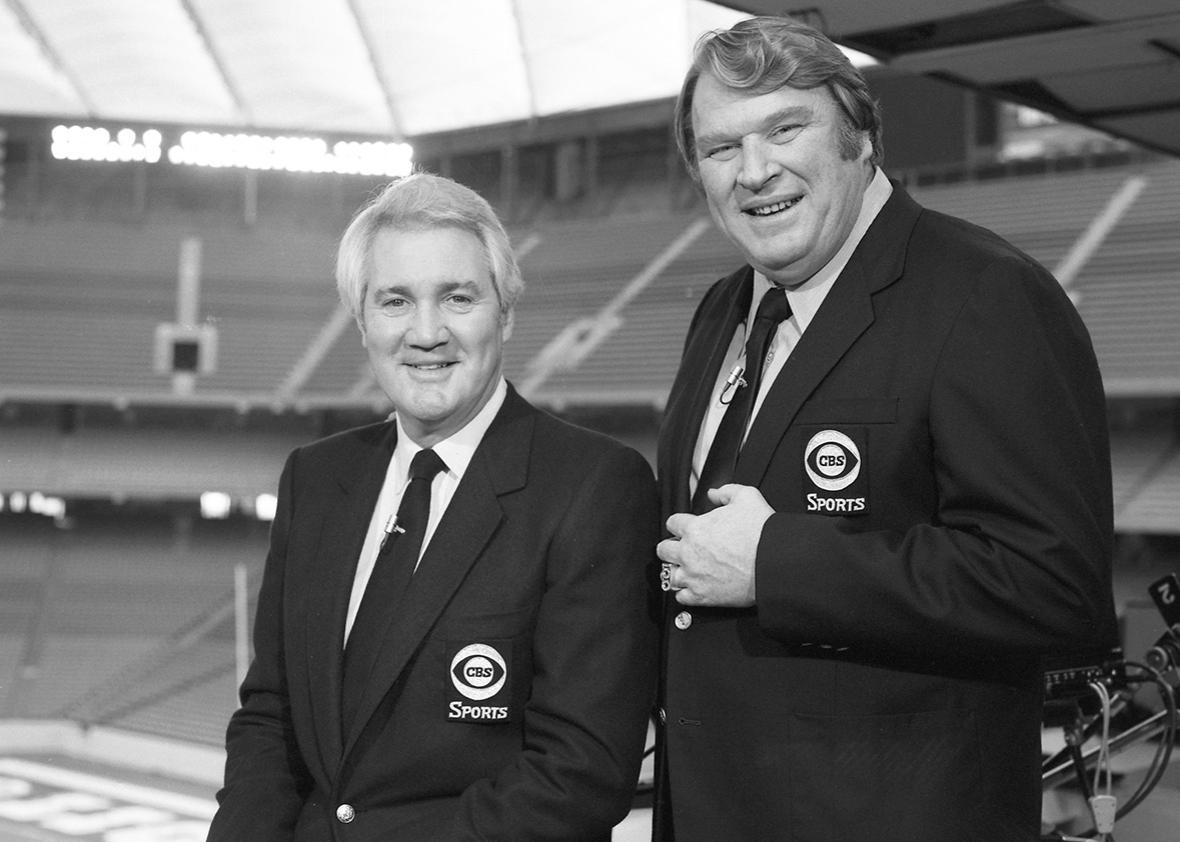
CBS via Getty Images
And then there’s Madden. The most rewarding part of this entire assignment was the chance to become reacquainted with the best football commentator of my or any lifetime. Madden is the only color man in the history of the Super Bowl whose remarks seemed like a joyful, funny conversation rather than a lecture. I laughed out loud at least once per game when Madden was in the booth. Take this moment, from Super Bowl XXXI, when he for some reason decided to narrate an aerial shot of the Superdome: “So that’s what, if you’re not in here watching the game, if you were outside, like just flying around, that’s what it would look like to you. If you’re watching the game from up here, you would go, ‘Oh, well, that’s … pretty good, I guess. I have no idea what’s going on inside.’ ” Another example: In Super Bowl XL, after a miked-up Jerome Bettis greeted his teammate Willie Parker with an enthusiastic “AAAAAHHHH!,” Madden chimed in with “That’s what you say to a guy after he makes a long run for a touchdown in the Super Bowl: AAHHH!” And then he giggled. I love John Madden.
John Madden and the other bests made the Super Bowl fun. Most of the time, though, the Super Bowl is anything but. In terms of rewatchability, old Super Bowls exist on the same level as the Ernest movies, except that the Ernest movies at least have the good sense to end after 90 minutes. It’s not just that the footage is often grainy, and that in older broadcasts the absence of modern staples like the on-screen score, time clock, and yellow first-down line are disorienting. It’s not just that it is boring to watch a four-hour game filled with pauses when you know how it’s going to turn out, you have no real sense of what happened in the preceding season, and you’re yoked to some squawking blowhard announcer who is not John Madden.
It’s more that the Super Bowl does not often exemplify those characteristics that make American football such a good game rather than just an impressive spectacle. For example: The Super Bowl is always played in good weather, when everybody knows that the best football games are played in horrible weather. This is a small complaint. Here’s a bigger one: More often than not, the Super Bowl is a messy, mistake-laden blowout. The average margin of victory across 49 Super Bowls is approximately 14 points. For every amazing catch or tackle or sequence of plays in Super Bowl history, there are countless other ugly moments, like Broncos quarterback Craig Morton tossing four interceptions before halftime in Super Bowl XII; or the Minnesota Vikings’ failure to score a single first-half point in any of their four Super Bowl appearances between 1970 and 1977; or the excruciating first quarter of Super Bowl XXVI between Washington and the Buffalo Bills, featuring the opening kickoff having to be rekicked because Bills kicker Brad Daluiso “misunderstood the referee’s signal”—the Buffalo Bills, everyone!—a botched hold leading to a missed field goal, and two interceptions. I’m a Bears fan, and all I remembered about Super Bowl XLI—the rare bad-weather Super Bowl!—was that Devin Hester returned the opening kickoff for a touchdown; watching it again, I quickly remembered how awful a football game it was: The Bears lost three fumbles total, and Rex Grossman threw two interceptions in the fourth quarter
Not only is the game itself usually played poorly, it is often devoid of drama. Only three teams have ever overcome even a 10-point deficit to win the Super Bowl: New England in Super Bowl XLIX, New Orleans in Super Bowl XLIV, and Washington in Super Bowl XXII. “This has the makings of the Super Bowl we’ve been waiting 22 years for,” an excited Al Michaels said during Washington’s comeback in Super Bowl XXII, meaning that the world waited nearly a quarter century for the Big Game to live up to its hype.
I want to talk about Super Bowl XXII, in which Washington beat Denver 42–10. It might not be widely acknowledged as the best Super Bowl ever, but it is my favorite. It’s certainly the most anomalous Super Bowl ever played. Denver, led by their golden boy quarterback John Elway, was supposed to win. Washington’s quarterback was the journeyman Doug Williams, who had only started two games that year; its running back the unaccomplished rookie Timmy Smith had started zero games and scored zero touchdowns. On the Broncos’ first offensive snap of the game, Elway tossed a bomb deep downfield to Ricky Nattiel for a touchdown. At the time it was the fastest touchdown in Super Bowl history. “No team has won game after trailing by more than 7 points at any time during game,” read an on-screen graphic. “Not only that, they’ve never caught up in the history of the Super Bowl!” the announcer said. Washington looked terrible. The game was all but settled.
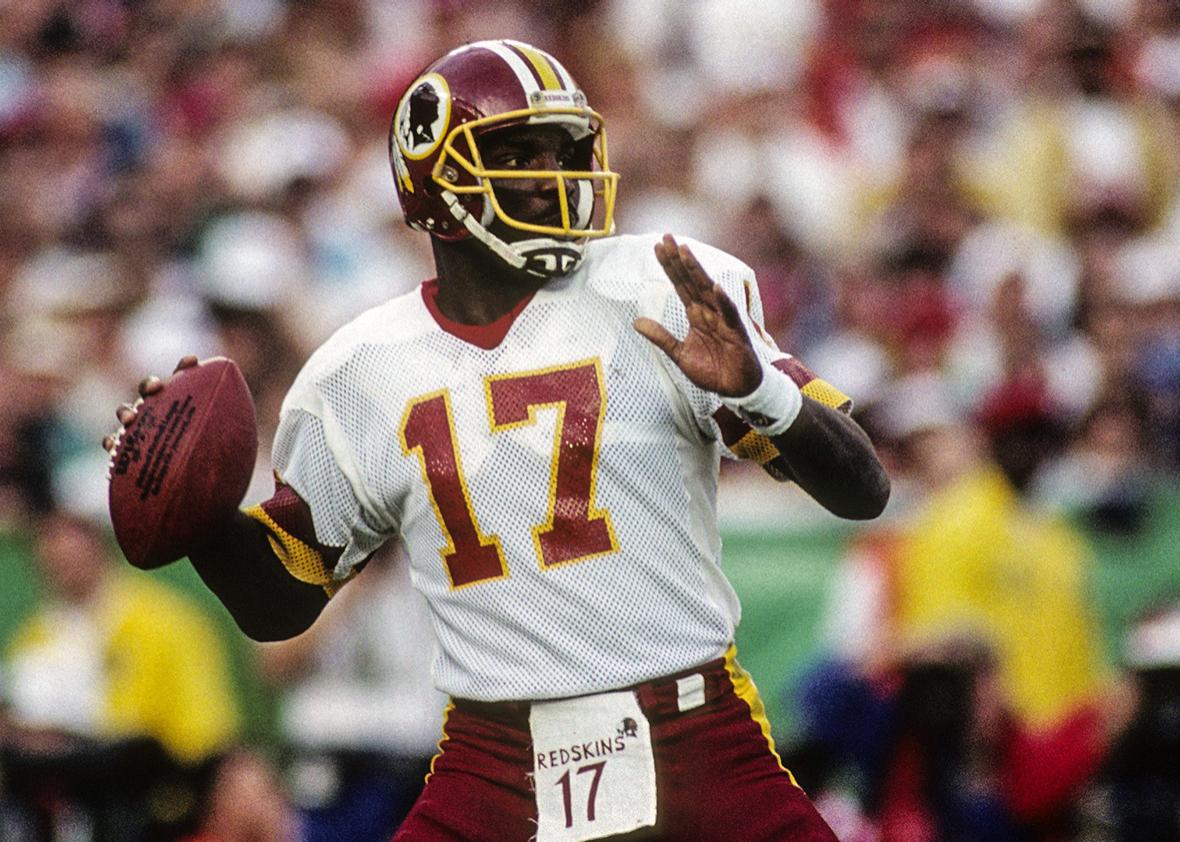
Washington quarterback Doug Williams drops back to pass during Super Bowl XXII against the Denver Broncos at Jack Murphy Stadium on Jan. 31, 1988, in San Diego.
George Rose/Getty Images
Also in Slate:
- “All 49 Super Bowls Ranked in Their Proper Numerical Order”
- “The Worst Super Bowl Ad of All Time Is Smug, Creepy, and Illogical. What Was Apple Thinking?”
- “The Best Forgotten Moments in Super Bowl History”
- “From Jet Packs to O.J. Simpson: The Five Super Bowl Moments That Most Defined Their Eras”
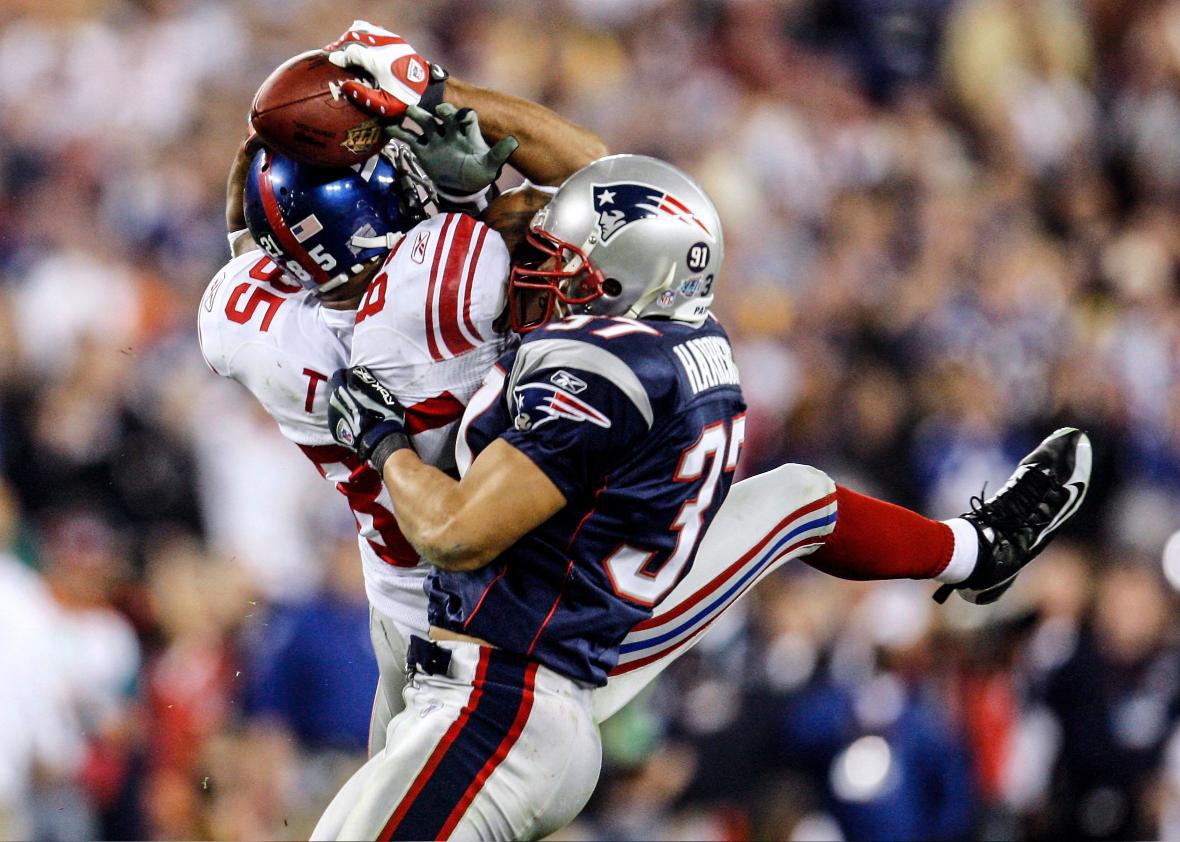
Shaun Best/Reuters
This sort of thing never happens. Super Bowl gameplay, even when it is tense and captivating, almost never feels significant. Take Super Bowl XLII, played between Tom Brady’s New England Patriots and Eli Manning’s New York Giants, for an example. The game was tight until the end, featuring multiple lead changes in the fourth quarter and an all-time great play in David Tyree’s helmet-assisted circus catch with a minute remaining. It’s regularly listed as one of the greatest Super Bowls ever. I respectfully disagree. The game was close, and exciting, but it wasn’t great. There’s no larger drama in a game between two mirror-image quarterbacks and two large-market teams accustomed to victory. Brady versus (either) Manning is sort of like the Cola Wars: Both sides are basically the same, they don’t really need your support, and they’ll both be around for years irrespective of any single outcome in their ongoing duel. That fourth-quarter exchange was the climax of an action film, maybe, but there was actual drama and beauty and meaning and possibility in the suddenness with which the unheralded Williams so completely overwhelmed Elway. Brady versus either Manning is an exercise not in possibility, but in inevitability.
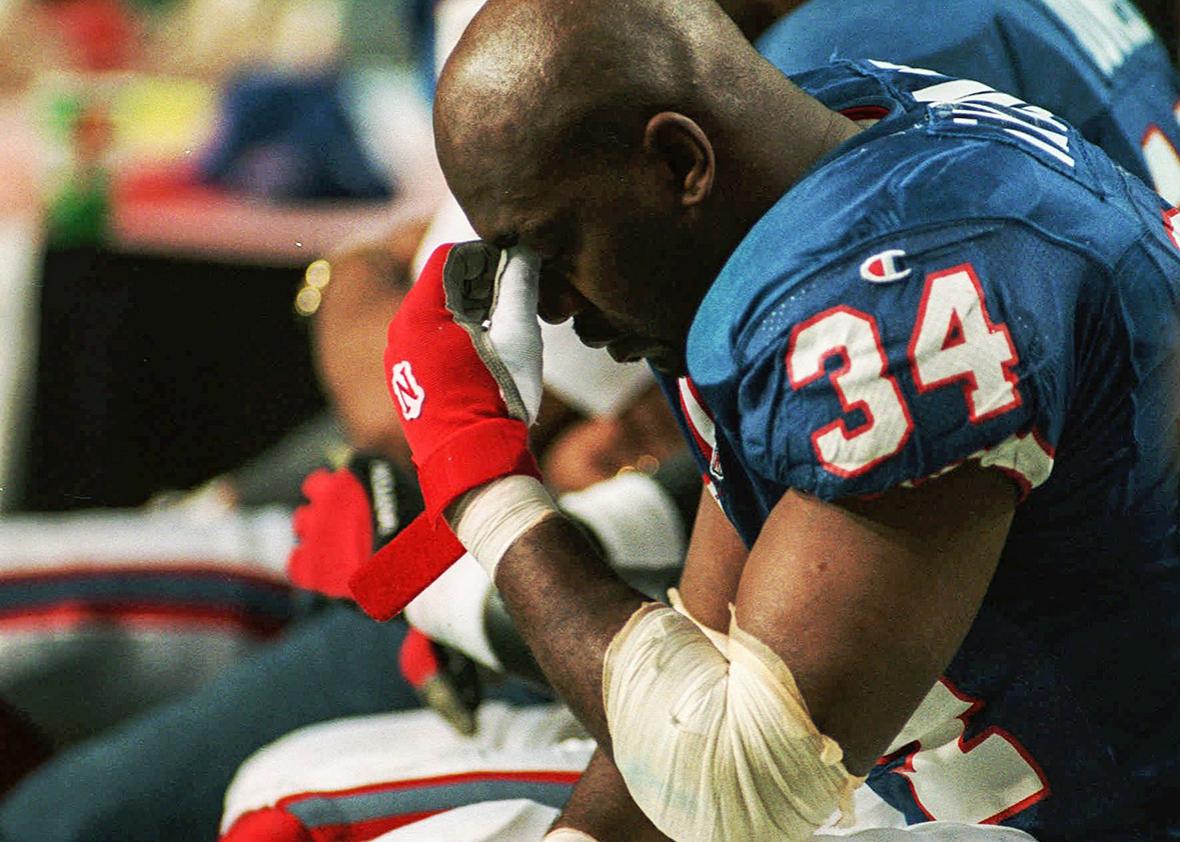
Rick Stewart/All Sport
Drama and beauty and meaning—while rare in the Super Bowl—have been found in failure, too. The Buffalo Bills became a punch line thanks to their four consecutive Super Bowl losses from 1991 to 1994, but to me the Bills are the most important Super Bowl franchise in history. Their consecutive losses, escalating in futility and desperation, were significant, creating drama and storylines that transcended the constraints of any individual game. The way in which they failed is significant, too. The Bills were arguably the last major Super Bowl team with any flair, with the possible exception of Kurt Warner’s St. Louis Rams. They ran a unique fast-paced no-huddle offense in which quarterback Jim Kelly read the defense at the line of scrimmage and called the play accordingly. This offense was enough to get them to the Super Bowl, but never to win it. In their first attempt, Super Bowl XXV, the Bills and coach Marv Levy met their polar opposites in the New York Giants and coach Bill Parcells. For his part, the Big Tuna actively rejected flair and fun in favor of a joyless game plan that controlled the clock, limited big plays, and took the ball out of the Bills’ hands. The Bills lost to the Giants that year. Kelly threw four interceptions the next year as the Bills lost again. In Super Bowls XXVII and XXVIII, the Bills lost handily to the Cowboys and pocket passer Troy Aikman. By the end of the Bills era, the Super Bowl had changed, and aspiring champions resolved to do the opposite of what the Bills had done: minimize mistakes. Stand in the pocket and throw the ball. Don’t try anything risky. Don’t be stupid.
I’ve heard it said that we’re living in the golden age of the Super Bowl right now. If you just look at the box scores, maybe that’s true. But it’s hard to come to that conclusion if you look at the game holistically. Since 2001, with the single exception of the Oakland Raiders in Super Bowl XXXVII, the AFC has been exclusively represented in the Super Bowl by either the New England Patriots, the Pittsburgh Steelers, the Baltimore Ravens, or whatever team Peyton Manning is playing for. Unless you’re a fan of one of the teams, it’s been hard to have any sort of rooting interest in the more recent games, even when they were close. I think it’s because the players on both sides are so polished that you can’t really differentiate between them. As bad as the Super Bowl games have always been—especially in an earlier era—there was at least more character to them back in the day. The Super Bowl teams from the 1970s and 1980s all had their own distinct personalities: the Landry Cowboys, the Bradshaw Steelers, the Joe Montana 49ers, the Ditka Bears. There has only been one Super Bowl team in recent memory with anything resembling a personal style: the surly, complaining Seattle Seahawks, who have made a cottage industry out of calling fans’ attention to the fact that the modern game is bland and that the NFL is stupid.
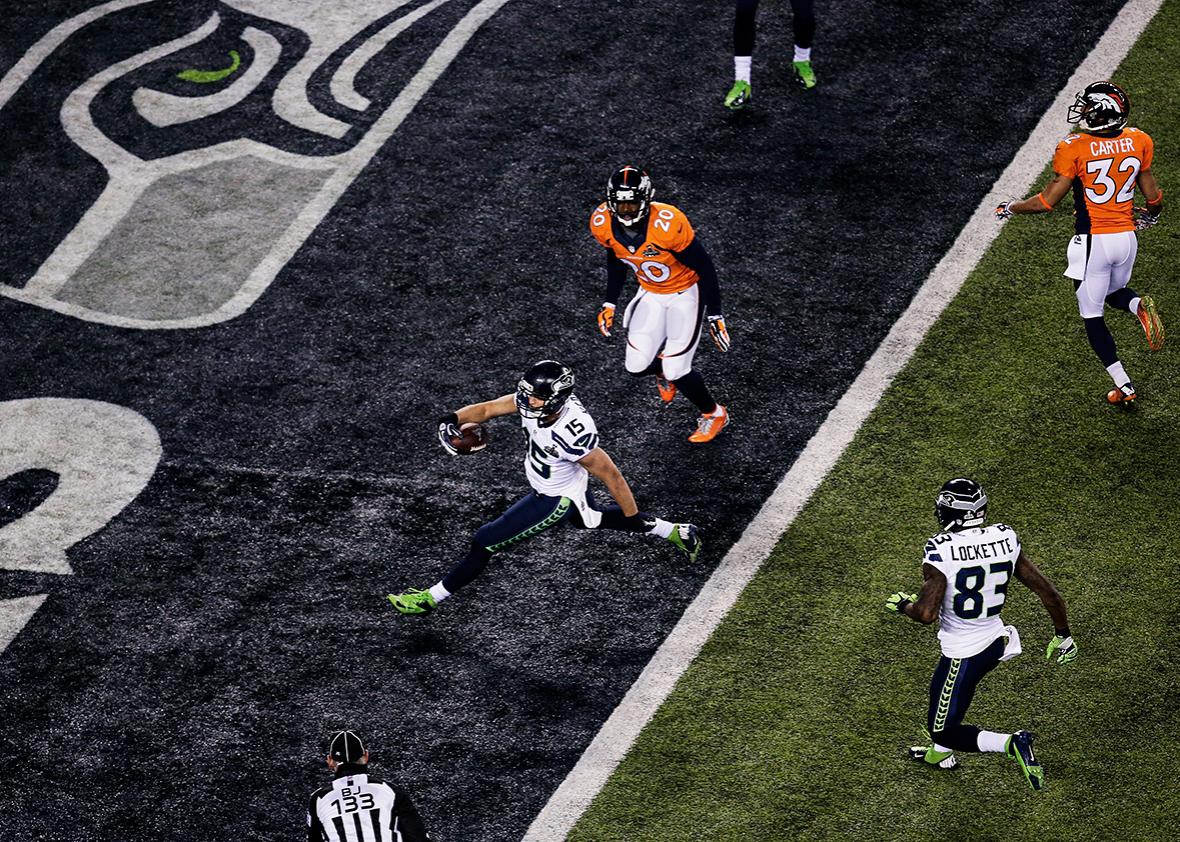
Wide receiver Jermaine Kearse of the Seahawks scores a 23-yard touchdown during Super Bowl XLVIII against the Broncos on Feb. 2, 2014, in East Rutherford, New Jersey.
Win McNamee/Getty Images
They’re not wrong. All the outside-the-lines NFL drama in recent years has been the sort of stuff that ought to make any thinking person reject the game: the domestic violence cases, the chronic traumatic encephalopathy revelations, the smarminess of commissioner Roger Goodell and his minions, their maddening efforts to make an inherently unsafe game “safe.” What are we celebrating when we watch the Super Bowl? After watching all of these games, it seems to me that we are actually watching the triumph of money over good sense—living proof that if you spend enough cash on something, you can make it matter to the world, even though the world has every reason to recoil. The Super Bowl and all the attendant hype is a successful effort to pretend that all these other complicating factors don’t exist, don’t matter; to pretend that the rockets on the rocket belts aren’t fueled by hydrogen peroxide, that the pigeons aren’t going to end up shitting on everything; to pretend that professional football is action without consequence, an image without a negative. The Super Bowl began as a rich man’s vanity project. Fifty years later, in many ways it still is.
So why are we still watching it? Is it stupid habit? Is it a sense of obligation? Are we hooked to the crude sybaritism of the annual Super Bowl party? Are we addicts who like combining all of our various drugs—watching football (even bad football), drinking, eating, gambling—into one big, glorious binge to help numb the midwinter blues, like railroad hobos guzzling cheap Tokay wine?
I have one theory. In 1912, the sociologist Émile Durkheim described a phenomenon he called “collective effervescence”: the moments in which members of a community, catalyzed by some overwhelming ritual observance, become of one mind. Durkheim was referring specifically to religious experience, and the collective effervescence of a faith community united in worship, but the concept transfers to all sorts of settings and is particularly useful in helping to understand sporting manias. Just as the ties that bind us to faith seem to defy rational explanation, so do those that bind us to teams, or sporting events.
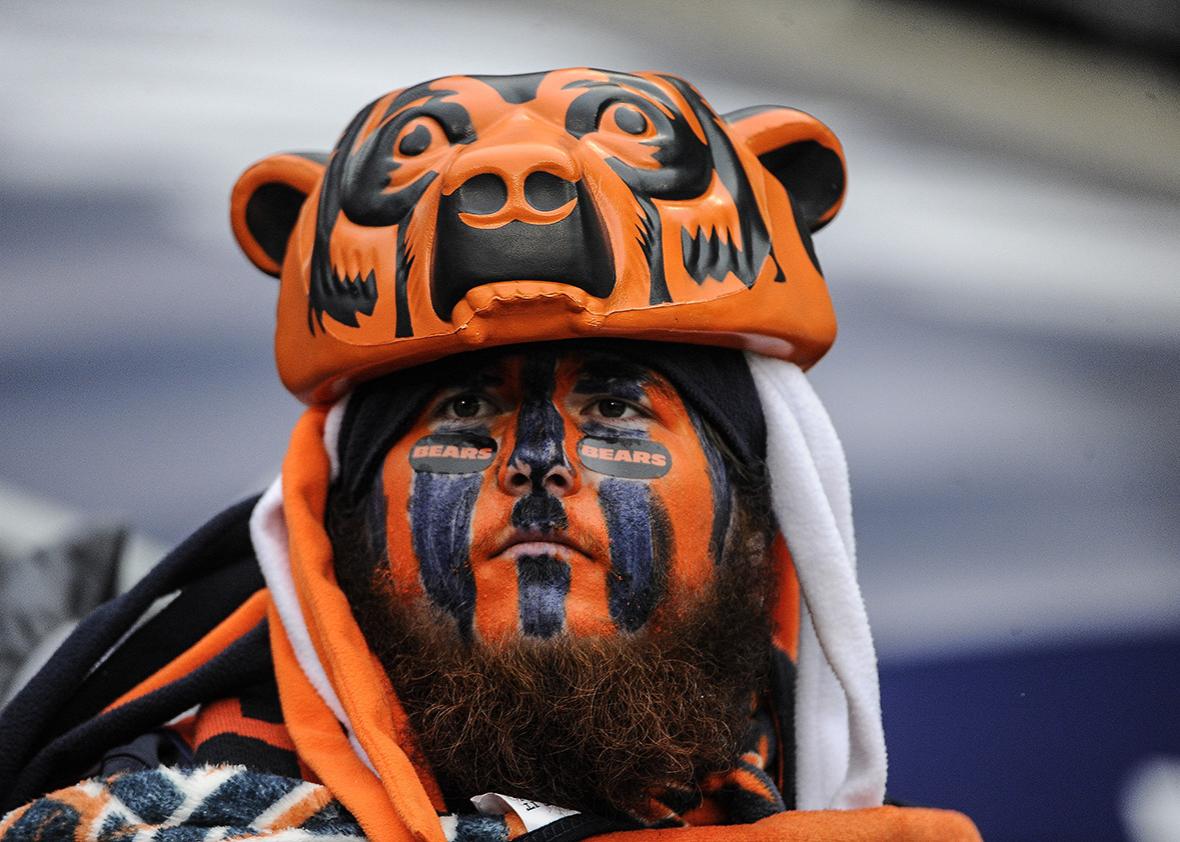
A Bears fan watches the game against the Lions on Jan. 3, 2016, at Soldier Field in Chicago.
David Banks/Getty Images
I can’t rationally explain why I am a Bears fan, for example. I can’t rationally explain why I watch football every week, or why I enjoy watching games in person. The Bears have been more often bad than good for as long as I’ve been alive, and the games themselves rarely give me any great pleasure. All I can say is that collective effervescence can uplift whether or not the proximate cause of said effervescence tends to fall flat. So perhaps it’s as simple as this: The Super Bowl is significant because it’s the Super Bowl, a yearly call to quorum, an event that is big enough to briefly unite us and meaningless enough to not immediately tear us apart.
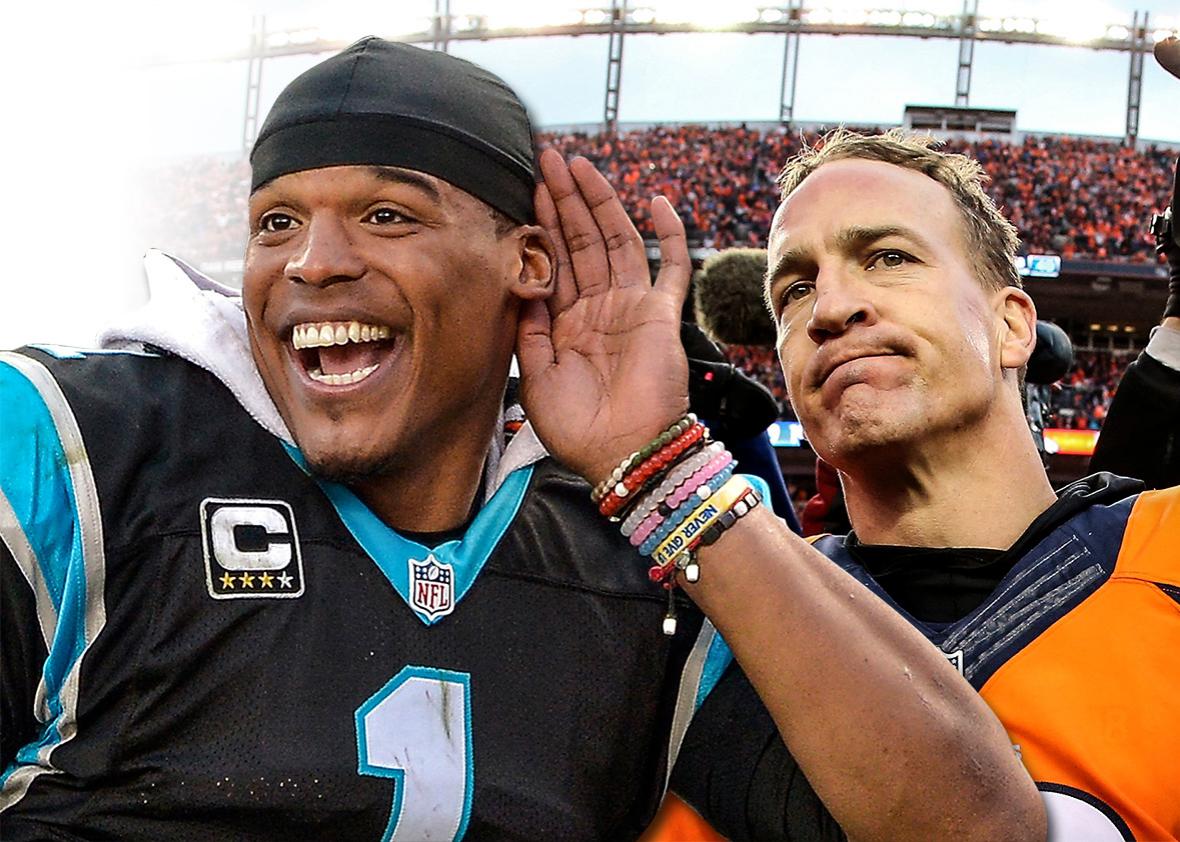
Photo illustration by Slate. Photos by Grant Halverson, Doug Pensinger/Getty Images.
I also can’t rationally explain why I’m going to watch the Super Bowl this weekend. I can try, sure. I can talk about how the Peyton Manning–Cam Newton matchup is the most disparate quarterback contest we’ve seen in years, how Ron Rivera is a clever coach, how I was in Denver once and liked it. I can say that Newton has as much fun as any player in football, that Manning’s precision passing can still drop jaws, that Super Bowl 50 might actually be that rare game that is tense and fun and maybe even good.
I say this knowing that I don’t believe it. I know that Peyton Manning is currently a man-shaped box marked “FRAGILE, DO NOT DROP,” that America’s ruddy racists will be watching Cam Newton and waiting in the hope that he fails, that announcers Jim Nantz and Phil Simms will disappoint. I know that I’ll lose money betting on that damn box thing that you play on Super Bowl Sunday, that I’ll gorge myself on corn chips and chicken fingers, that I’ll drink too much and feel bad about it on Monday.
And I know that you’ll have much the same experience, whoever you are, wherever you are. And I guess that’s the thing to look forward to.
